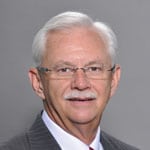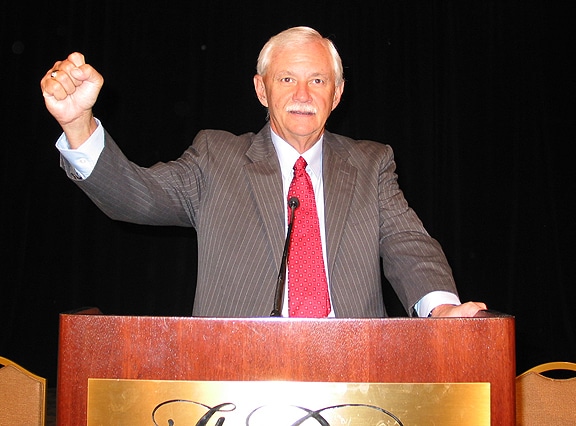
Delivering on the theme of the 2012 regional meetings – “We will not back down” – UTU International President Mike Futhey told more than 1,000 attendees at the Memphis meeting how the UTU is using every tool available – negotiations, legislative and legal — to defend its members’ jobs and workplace safety.
* On the Belt Railway of Chicago, where the carrier is demanding contract changes to permit one person crews at carrier discretion, the UTU has asked the National Mediation Board to declare a bargaining impasse. Belt Railway General Chairperson Chris Votteler’s negotiating team, assisted by International Vice President Delbert Strunk, faces a carrier that refuses to take crew consist changes off the table – three years following start of negotiations — even though the carrier is party to a moratorium on the issue.
“We will take every action necessary to protect our members’ jobs. We will not stand down on crew consist,” Futhey said.
* As to conductor certification — mandated by Congress and put into regulatory language by the Federal Railroad Administration – Norfolk Southern has filed an FRA-required certification plan without discussion and coordination with general chairpersons.
The NS proposed plan seeks to provide a pilot for remedial training only for conductors who have not traveled over a territory for 36 months, rather than the 12 months required in current agreements; and then seeks to place the burden of notification solely on the conductor rather than tracking the time period electronically. Additionally, the NS plan does not discuss procedures it will follow in an investigation even though FRA regulations require railroads to provide all documents and the list of witnesses prior to a hearing.
Futhey said the UTU will not permit “a tortured interpretation” of congressional and FRA intent, and will work to ensure every railroad follows the letter and intent of the law and regulations prior to the required Sept. 1 deadline for certifying conductors.
* In Pennsylvania, Norfolk Southern is attempting to disregard state safety laws and regulations through federal preemption affecting workplace safety at hump yards. “We will take every action necessary to prevent railroads from weakening workplace safety protections, whether at the state or federal level,” Futhey said.
* Pointing to millions of dollars in fines assessed by the Occupational Safety and Health Administration against railroads that have harassed, intimidated, disciplined and fired workers for reporting injuries and workplace safety concerns, Futhey reminded members that UTU designated legal counsel is pledged to assist in bringing and pursuing such complaints. Information on filing these complaints is available at the UTU website at www.utu.org by searching “OSHA.”
“We are not going to allow carriers to continue their pattern of harassment and intimidation of workers who are injured on the job,” Futhey said. “The FRA and OSHA recently signed a letter of intent to investigate jointly all complaints of carrier harassment and intimidation, and the FRA has informed each carrier of its intent to work with OSHA to end the long-standing practice of carriers disciplining injured workers “where the facts fail to support the charges. We are lawyered up, too, and will take this to wherever we must to protect the interests of our members.”
* Recalling the horrific murder of a UTU-member bus driver in Los Angeles, the fatal shooting of a train-crew member near New Orleans, and assaults on bus operators and intrusions into locomotive cabs by armed robbers elsewhere, Futhey said the UTU is working with lawmakers and regulators to implement better safeguards for its air, bus and rail members. The FRA recently imposed a requirement that all new and remanufactured locomotive cabs be equipped with secure cab locks.
“I promise every member that the UTU will stand shoulder-to-shoulder with our members to ensure their safety. Our voice will be heard,” Futhey said.
As to the state of the union, Futhey said the International’s general fund balance is improving as carriers bring back furloughed workers, that the UTU Insurance Association now has a $28 million surplus and is financially strong, and the Discipline Income Protection Plan (DIPP) is financially sound with more than $10 million in assets.
Futhey emphasized that while competing plans often seek ways to deny payment of claims, the UTU’s DIPP is aggressive in paying claims. Futhey cited an example of two workers on the same assignment on CSX – one covered by the UTU’s DIPP and the other by a competing plan – who were both suspended. “Where the competing plan denied the claim, DIPP paid the claim. End of story.”
As for the UTU’s disability insurance plan covering bus and rail members, Futhey said it has paid out more than $22 million in disability benefits for off-duty injuries and is proving to be a valuable benefit.
As to organizing, Futhey said that since January 2008, when he took office, the UTU has an unprecedented record of organizing one new property every seven weeks. One of the first post-merger coordinations has been the joint strengthening with the Sheet Metal Workers International Association of organizing efforts, which makes greater resources available for organizing transportation, building trades and production workers.
Futhey also explained how the UTU negotiating strategy in national handling has already paid off for rail members covered by the national rail contract.
“When we entered national rail contract negotiations, our strategy was to hold the monthly cost sharing premium under $200 — rather than allow it to escalate to $300 or more — in exchange for somewhat higher copays,” Futhey said. “The Affordable Care Act now eliminates many of those copays, saving affected members out-of-pocket for many health care services while those members enjoy one of the lowest cost-sharing premiums in the public and private sectors.”

Related News
- Yardmaster Protection Act Introduced
- PHOTO GALLERY: 2025 Denver Regional Training Seminar
- Fighting for Stronger Heat Protections for Rail Workers
- Regional Training Seminar Sets (Mile-High) Record in Denver
- Registration Open for Anaheim Regional Training Seminar
- Help Promote Rail Crossing Safety on ENS Sign Awareness Day
- Streak of Organizing Wins, Strong Agreements Highlights the SMART-TD Difference
- Sisters Represent TD at Charity Mud Race
- New College Education Benefit Available for SMART-TD Members and Their Families
- Members drive legislative action in New England